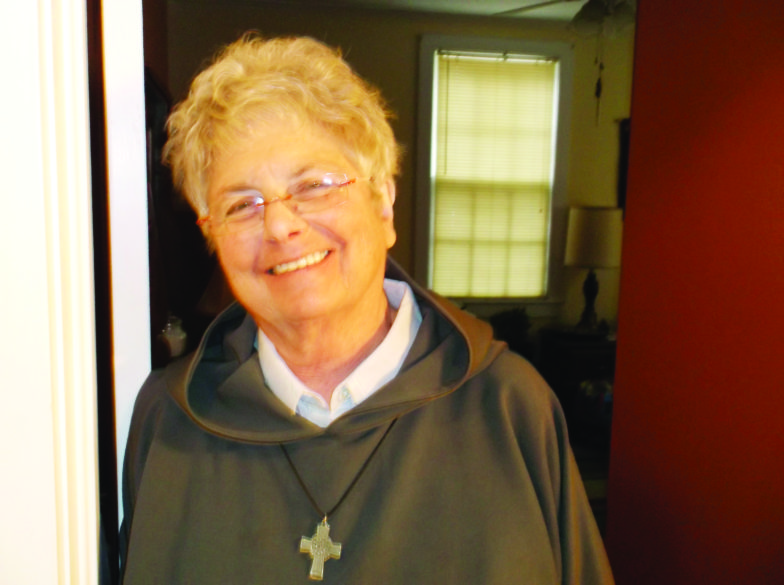From the hermitage
By sister alies therese
“Abba Pambo asked Abba Anthony (The Father of Hermits 4thC), ‘What ought I to do?’ Abba Anthony replied, ‘Have no confidence in your own virtuousness. Do not worry about a thing once it has been done. Control your tongue and your belly.’”

Actually, the hermits were trying to get some clarification as to whether they were being ‘good hermits’ or not, so Abba Anthony’s friend Abba Nisteros the Great replied: ‘Not all works are alike. For Scripture says that Abraham was hospitable, and God was with him; Elijah loved solitary prayer and God was with him; and David was humble, and God was with him. Therefore, whatever you see your soul desire according to God, do that thing, and you will keep your heart safe.’” (The Sayings of the Desert Fathers, Ward, SLG).
Conceivably these folks might have been married, asking how to make a perfect marriage or maybe priests or a bishop asking how to do perfect works. We all want to know, from someone with perhaps more experience than our own, how to do the works of the Gospel perfectly.
Equally, they might just have been trying their hearers with the notion that they can indeed become perfect on their own if they just knew how to do it! Not possible. Many opportunities to be compassionate and hospitable come our way with or without ‘titles’ or ‘important’ jobs. Gratitude, for example, is a work of compassion we can all share in. The Scriptures mention so many and no one person can do them all!
Compassion is not a virtue, but a way of life. Hospitality calls us to receive others as Christ. You are probably familiar with Exodus 20:15ff where the Scriptures give us an outline of a compassionate life. Who do we see there as most compassionate? Well, God. ‘… and if they cry out to Me, I will surely hear their cry.’ (21) Perhaps it is also just another way of saying that our Christian way of life is: Love of God, Love of neighbor? That includes those with whom you disagree!
A compassionate life has been shown in many and varied ways in our Christian Catholic life. We can look to founders of religious orders that focused on education of the poor, healing the sick, or living a life of prayer. We look to first-responders, nurses, doctors, those who put their lives on the line. We only have to look to Ephesians 4ff to get some ideas about how these might be lived in the community. Paul in prison, (after mentioning all sorts of horrid things we do) says this: ‘in place of these, be kind to one another, compassionate and mutually forgiving, just as God has forgiven you in Christ.’ (32)
Our days have been difficult. Political squabbles have caused families to cease speaking to one another and anger has flourished. Election outcomes have distanced many. Christians still persecuted; do we pray for their persecutors?
We might focus on the compassion of Jesus, hanging from the Cross, midst great anguish, focuses on the thief next to Him: ‘a single good word made the thief pure and holy, despite all his previous crimes, and brought him into Paradise.’ (Luke 23:42) [Philokalia #90, page 319]
How can we learn one single, good ‘word’ for someone who comes to us; that may all they need to hear? In this time of pandemic, in this month remembering those who have died/served, in this time of Thanksgiving, in this time of Christ the King, in this beginning of Advent we have many ‘words’ to learn. Can we draw forth from God in humility what we need and then share that with whomever the Lord brings onto our path?
Another place in our devotional life is the 6th and 8th Stations, – Veronica, who in her compassion for Jesus gently wipes His face. The women weep over their children. Are the children in cages, the 550+ still separated from their parents, those who live on Death Row at Parchman (or anywhere in our prisons) are their faces being wiped in gentleness and compassion? The COVID patients still dying and the many who suffer while recovering. Who speaks a word of compassion into their ears encouraging them to stick it out? Who brings a word of compassion to their families? Who speaks a word of compassion to you when you feel abandoned, lost or that God is far away? Remember, ‘the treasury of compassion is inexhaustible’ (Faustina, Chaplet, Closing Prayer).
Amma Syncletica puts it plainly: ‘Whatever people say by the grace of the Spirit, therefore, that is useful, springs from love (compassion) and end in it. Salvation, then, is exactly this – the two-fold love of God and of our neighbor.’ (Life, Bongie, 1996)
Blessings.
(Sister alies therese is a vowed Catholic solitary who lives an eremitical life. Her days are formed around prayer, art and writing. She lives and writes in Mississippi.)
